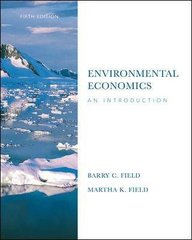Question
OPEC and the Complications of Cartels The course has never been wholly smooth among the nations of OPEC. Still, the cartel, with its price and
OPEC and the Complications of Cartels
The course has never been wholly smooth among the nations of OPEC. Still, the cartel, with its price and production-control maneuvers, was a mighty force in the 1970s.
OPEC is not dead, but it is now a Samson with a crew cut. Its difficulties have steadily grown since 1979. It now reacts to rather than dictates to the world petroleum market. And the reactions are not entirely peacefully orchestrated within the family. Each member would like to maintain sales at high prices; it has become apparent that either sales or prices will have to be reduced; but the members differ on how much to adjust sales or price and on how to distribute the adjustment costs among themselves.
It is not surprising that the power of OPEC would be diluted over time. The rest of the world has curtailed consumption, developed alternative supplies and accumulated strategic reserves. And it is not surprising that, with the dilution, members of the group would break ranks on how to make disagreeable adjustments to deteriorating circumstances.
In broad outline, the rise and decline of OPEC is consistent with the troubled history of cartels. Contrary to common mythology, cartels have not been readily formed and highly effective over prolonged periods, and the world of commerce is not dominated by beady-eyed, cigar-chomping, rapacious cartelists.
It is not easy to organize a cartel, melding highly autonomous organizations into a monopolistic facsimile. There are markets to divide, prices to set, and production quotas to assign. Successful operation is even harder than initial organization. Members must remain persuaded that they enjoy net benefits from collusion compared to acting as independent agents. The more profitable the collusive efforts, the greater the incentive for outsiders to seek admission or to organize their own club or individually to compete. The more numerous the participants and the more lucrative the tightening of the screws on consumers, the greater the temptation for individual members to cheatand the greater the fear of each that some other member will cheat.
Long-term survival of the cartel has two fundamental requirements: first, cheating by a member on the stipulated prices, outputs and markets must be detectable; second, detected cheating must be adequately punishable without leading to a break-up of the cartel. Because of competitionovert competition from outside or sub rosa competitionwithineffective cartels cannot expect a long life.
OPEC has cracked its big whip longer than have most. Many initially doubted that it would last as long as a decade. The longevity may be attributed largely to the cartelists being governments rather than corporations, to the tribal emotionalism which stoked stubborn ambitions and to inept responses by oil-importing countries. But even OPEC has found competition of the market to be a formidable foe of collusion.
1. Why would countries with far larger oil reserves and current outputs be less likely to cheat on OPEC and more likely to be pricing "moderates" than smaller members with more limited reserves?
2. How did domestic policies, such as crude oil price ceilings, that held down U.S. oil output, help OPEC?
Step by Step Solution
There are 3 Steps involved in it
Step: 1

Get Instant Access to Expert-Tailored Solutions
See step-by-step solutions with expert insights and AI powered tools for academic success
Step: 2

Step: 3

Ace Your Homework with AI
Get the answers you need in no time with our AI-driven, step-by-step assistance
Get Started


